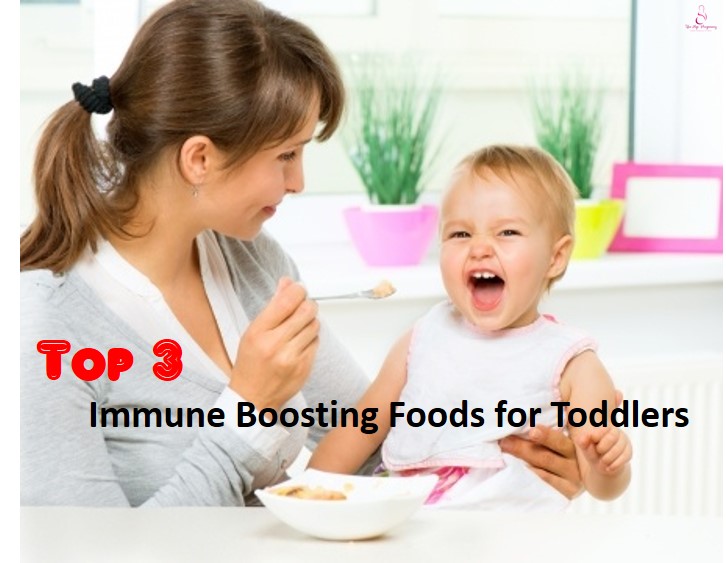
One of the greatest concerns parents have is their children falling ill.
When your toddler succumbs to the flu bug, or when he or she gets infected with contagious diseases like the hand-foot-mouth disease, it is probably heart-breaking for you to see your young one suffer from symptoms of the illness. Your routine may also be disrupted, because you have to take time away to nurse your child back to health. In some unfortunate cases, the situation could become devastating, such as when the infection develops into something more scarring (e.g. brain damage) or even life-threatening.
It might be during these times that you wish you could do something to improve the immunity of your child (and not just rely on vaccinations for your baby).
Well, the good news is that there are foods you could feed your toddler to improve his or her immunity. Below are three such immunity-boosting foods you should seriously consider (of course, these are not the only ones).
With improved immunity, it does not mean that your child will not fall ill ever again. He or she is after all in the process of developing immunity. What it means, however, is that with good nutrition and a well-regulated immune system, most of the infections that your toddler gets will be milder and will go away more quickly.
Flaxseed oil
Your child’s body (and yours too) needs essential fatty acids (EFAs) for good health, as the body uses EFAs for the production of healthy cells. When it comes to the immune system, EFAs are crucial for the production of prostaglandins, which regulates the activity of white blood cells (responsible for immune responses) in the body. This means that if you want your toddler to have good immunity (as well as good overall health), you will need to ensure sufficient EFAs in his or her diet, since the body is not able to produce these substances.
There are two commonly-known groups of EFAs, namely omega-3 and omega-6 EFAs. Do you know which ones are more important?
The answer is: both. The two groups are actually equally important. In fact, a balance needs to be achieved. However, the modern diet is filled with omega-6s, through the regular use of vegetable oils and consumption of animals fed on seeds (e.g. corn), while foods that contain omega-3s are less regularly consumed. Such dietary habits leave many children, as well as adults, deficient in omega-3 EFAs.
Food-grade flaxseed oil (also known as linseed oil) is one of the best answers to the omega-3-shortage problem that your toddler may be facing. Flaxseed oil actually contains twice as much omega-3 fatty acids as fish oil. It is also the most abundant source of plant lignans, which is found in studies to provide substantial anti-cancer protection.
So start your child on flaxseed oil today. Mix the flaxseed oil with his or her rice, drizzle the oil over the vegetable or meat dish, or add the oil to the next smoothie. The oil has a sweet and nutty flavor, which can add flavor to your toddler’s food. Use 1 teaspoon of the oil a day for a 1 to 2-year-old, 2 teaspoons a day for a 2 to 3-year-old, and 1 tablespoon a day for toddlers above 3 years old.
Always look for cold-pressed flaxseed oil stored in opaque bottles, and keep your flaxseed oil refrigerated.
Broccoli
Broccoli is one nutrient-dense food you can give to your toddler.
Especially rich in vitamin C, this member of the cruciferous vegetable family is an excellent immune-enhancer. Vitamin C is needed by the body to destroy viruses in the body, and it is also a powerful antioxidant that protects your immune cells from the oxidative damage of free radicals.
Besides containing vitamin C, broccoli also has large amounts of vitamins A and K, as well as folic acid and fiber, In addition, many protective chemicals against cancer are also found in broccoli. In fact, preliminary studies have found that cancer risk can be halved by consuming about 900g of broccoli (or similar vegetables like cabbage and cauliflower) every week.
Many children love broccoli, so do not be afraid to introduce this nutritious green vegetable to your toddler. It is best served lightly steamed or boiled. It can even be eaten raw!
If your toddler refuses the vegetable, do not try to persuade him or her otherwise by dangling favorite junk foods as rewards. Doing so would only convince him or her that broccoli is “punishment” and the junk foods are “important”. Continue, on a different day, to encourage your toddler to give the food a try. And if eating broccoli has not been made into a sore point, chances are that he or she will eat them eventually. Since eating can be more fun when done using hands, it may help to allow your little one to eat the broccoli with his or her hands.
Yoghurt
Rather popular amongst children, yoghurt is a good source of protein, calcium, vitamin B12 and zinc for your toddler. Produced by adding bacterial cultures to milk, they are especially important as sources of probiotics (bacteria beneficial to the gut) for your little one.
By helping your child maintain a healthy intestinal-flora balance and suppressing harmful bacteria in the gut, the probiotics in yoghurt can actually help improve his or her intestinal health, especially after a course of antibiotic treatment. The probiotics can also help enhance immunity and contribute to the detoxification of many cancer-causing substances in the body. This means that yoghurt is not only good for boosting immunity, they are also great for cancer-prevention.
If you wish to introduce yoghurt into the diet of your toddler, go for those with “live active cultures”, since the process of pasteurization probably kills all bacteria, good and bad, in the food. Avoid yoghurt with artificial coloring and flavoring. Beware of sugar (sometimes labeled as sucrose or fructose) added in conventional yoghurts, as sugars are well-known for lowering immunity. You won’t want the immunity-suppressing effects of sugar to undo the immunity-enhancing effects of your yoghurt.
References[1] Murray, Michael, ND., Pizzorno, Joseph, ND., and Pizzorno, Lara, MA, LMT. The Encyclopedia of Healing Foods. New York, NY: Atria Books, 2005. Print.
[2] Galland, Leo, M.D., and Buchman, Dian Dincin, Ph.D. Superimmunity For Kids. New York, Ny: Dell Publishing, 1989. Print.
[3] Yeager, Selene, et al. The Doctors Book of Food Remedies. New York, NY: Rodale, 2007. Print.
By Cindy L. from Insights On Health.






